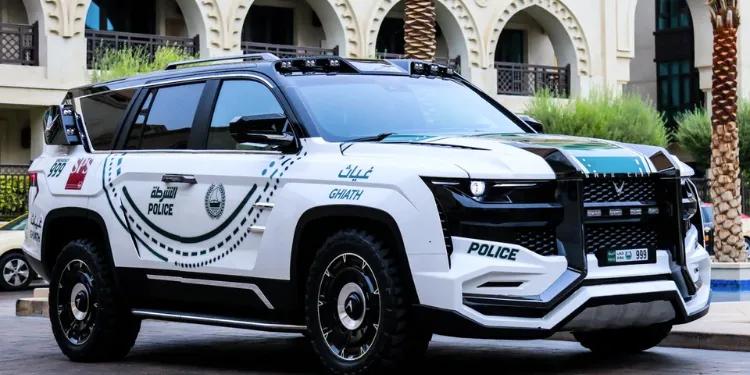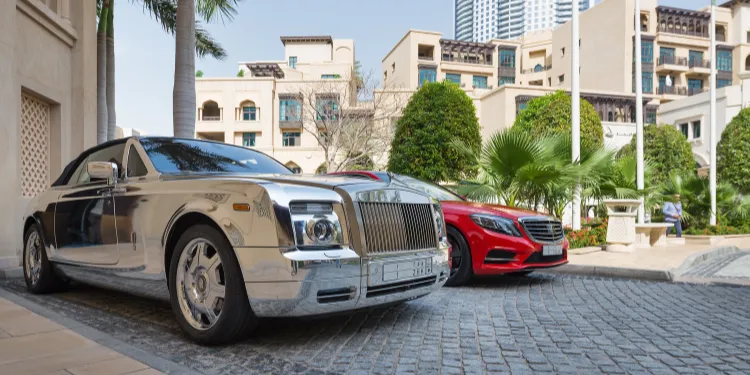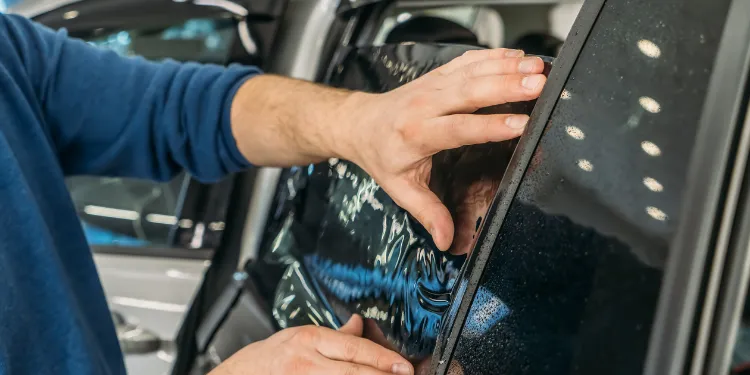Table of Contents

Tinting car windows is a popular practice among car owners, as it not only enhances the vehicle’s appearance but also provides several benefits such as privacy, protection from harmful UV rays, and heat reduction. However, when it comes to tinting car windows, it’s crucial to ensure compliance with the legal regulations of the country. In the United Arab Emirates (UAE), the laws regarding tinted windows are quite strict.
1 Understanding Window Tinting Regulations in UAE
The UAE has specific regulations in place to maintain road safety and ensure clear visibility for drivers. These regulations extend to the permissible tinting limits for car windows. The percentage of visible light transmission (VLT) determines the darkness of the window tint. In simpler terms, it indicates how much light can pass through the tinted windows.
Window tinting regulations exist to strike a balance between allowing car owners to tint their windows for various reasons and ensuring that visibility from inside the vehicle is not compromised. These regulations aim to prevent accidents caused by reduced visibility due to excessively dark window tints.
2 Legal Limits for Car Window Tinting in UAE
In the UAE, the law states that the front windshield should have a minimum of 70% VLT, meaning it must allow at least 70% of light to pass through. This regulation ensures maximum visibility for the driver, especially during nighttime or in low-light conditions. The front side windows, on the other hand, should have a minimum VLT of 50%. This means that 50% of light should be able to pass through the tinted glass.
It’s important to note that different car models and types may have different default VLTs for their windows. Therefore, it is essential to consult the manufacturer’s specifications or seek professional advice before applying film to ensure compliance with the legal limits.
3 Penalties for Illegal Window Tinting in UAE

https://twitter.com/Chemi_Camb/status/1414207933814951936/photo/3
The UAE authorities take the enforcement of window tinting regulations seriously. If you fail to comply with the legal limits mentioned above, you may face penalties and fines. These penalties can include hefty fines, impoundment of the vehicle, or even the suspension of your driver’s license. It’s essential to understand these consequences and adhere to the regulations to avoid any legal trouble.
To ensure compliance with the regulations, it is recommended to have your car tinted by a professional service provider who is knowledgeable about the legal limits and can guarantee compliance. Additionally, regular inspections of your vehicle’s window tinting can help identify any issues or changes that may result in non-compliance.
4 Benefits of Legal Window Tinting in UAE
Adhering to the legal limits for window tinting in the UAE not only helps you avoid penalties but also offers several benefits. Let’s take a look at some of the advantages of it:
1. UV Radiation Protection
Window tinting films can block harmful ultraviolet (UV) rays from the sun. These rays not only damage your skin but also lead to the fading of your car’s interior. By investing in legal, you can protect yourself, your passengers, and your vehicle from the harmful effects of UV radiation.
UV radiation can cause skin cancer, premature aging, and other skin-related issues. Legal tints acts as a barrier, reducing the amount of UV rays that penetrate the car’s interior. This protection is particularly important in a sunny country like the UAE, where the exposure to UV radiation is high.
2. Heat Reduction
The scorching heat in the UAE can make driving uncomfortable, especially during the summer months. Legal tints can significantly reduce the amount of heat entering your vehicle, keeping the interior cooler and making your driving experience more pleasant.
Window tinting films have heat-rejecting properties that help to block a significant amount of solar heat. This reduces the need for excessive air conditioning, which in turn saves fuel consumption and reduces greenhouse gas emissions. Additionally, a cooler interior temperature enhances the overall comfort of both the driver and passengers.
3. Enhanced Privacy
Window tinting provides an added layer of privacy, preventing outsiders from easily seeing into your vehicle. This can be particularly beneficial if you have valuable items inside your car or if you simply prefer to have some privacy while driving.
Privacy is a significant concern for many car owners, especially when driving in congested areas or parking in public spaces. Legal window tinting allows you to maintain your privacy without obstructing your view of the road. It also acts as a deterrent for potential theft by keeping valuable items out of sight.
4. Glare Reduction
Glare from the sun or bright headlights can be distracting and potentially dangerous while driving. Legal window tinting can help reduce the glare, allowing you to have a clearer view of the road ahead, improving overall safety.
Glare can impair a driver’s vision, causing temporary blindness or difficulty in perceiving objects on the road. By reducing glare, legal window tinting helps enhance visibility and reduces the risk of accidents caused by glare-related distractions. It also minimizes eye strain, making long drives more comfortable and less fatiguing.
5 Choosing the Right Window Tint
When it comes to selecting the right window tint for your car, it’s crucial to consider the legal limits as well as your personal preferences. Working with a professional tinter service provider can ensure that you choose a tint that complies with UAE regulations while meeting your specific requirements.
Professional window tinting service providers have the expertise to guide you in selecting the appropriate window tint based on factors such as VLT, heat rejection capabilities, and brand reputation. They can also provide valuable insights into the different types of films available, their durability, and warranty options. It’s important to choose a reputable service provider to ensure the best results and compliance with the regulations.

6 Maintaining Your Window Tint
Once you’ve installed legal window tinting on your car, it’s important to take proper care of it to ensure its longevity and performance. Here are some tips for maintaining your window tint:
- Clean the tinted windows using a soft cloth and a mild, non-abrasive cleaning solution.
- Avoid using abrasive materials or harsh chemicals that can damage the tint.
- Regularly inspect the tint for any signs of peeling or bubbling and address any issues promptly.
Following these maintenance guidelines will help your window tint last longer and continue providing you with the benefits it offers.
7 Conclusion
In conclusion, the legality of window tinting in the UAE is regulated by specific guidelines. To comply with the law, the front windshield must have a minimum VLT of 70%, while the front side windows should have a minimum VLT of 50%. It’s crucial to adhere to these limits to avoid penalties and ensure road safety. Legal window tinting offers numerous benefits, including UV radiation protection, heat reduction, enhanced privacy, and glare reduction. By selecting the right window tint and properly maintaining it, you can enjoy these advantages while staying within the legal boundaries.

8 FAQ
Q: What are the legal limits for car window tinting in the UAE?
A: In the UAE, the front windshield must have a minimum visible light transmission (VLT) of 70%, while the front side windows should have a minimum VLT of 50%.
Q: What are the penalties for illegal window tinting in the UAE?
A: Failure to comply with the legal limits for tinted windows in the UAE can result in penalties such as hefty fines, impoundment of the vehicle, or even the suspension of the driver’s license.
Q: What are the benefits of legal window tinting in the UAE?
A: In the UAE offers benefits such as UV radiation protection, heat reduction, enhanced privacy, and glare reduction.
Q: How can I maintain my car’s window tint?
A: To maintain your car’s window tint, clean the tinted windows using a soft cloth and mild, non-abrasive cleaning solution, avoid using harsh chemicals, and regularly inspect for any signs of peeling or bubbling.











